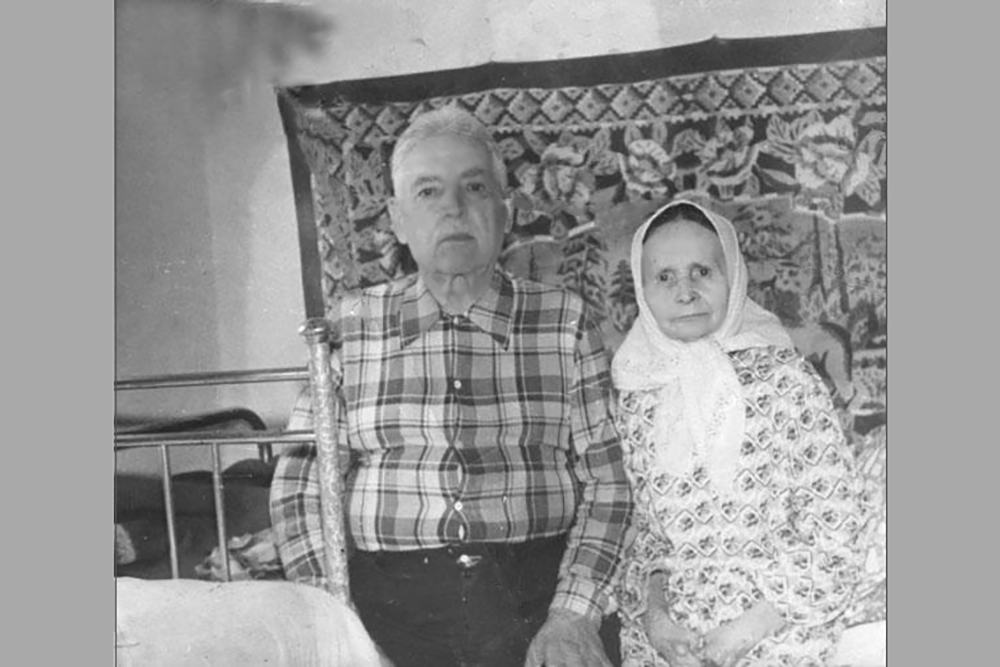Bank of Portraits / Kotsiubailo Teklia and Pylyp, their sons Oleksandr and Andrii

Kotsiubailo Teklia and Pylyp, their sons Oleksandr and Andrii
Fania Rozenfeld grew up in the large Jewish family. The girl was 19 y.o. when the Nazis captured her native village of Rafalifka in the Rivne region. The family survived the days of anarchy, when the local bandits robbed the Jews, at their Ukrainian friends. Coming back to their robbed house, she tried to live under the new authorities.
In the spring of 1942, the Jews from Rafalivka were resettled to the ghetto, located 12 km far from the village, near the railway station. On August 29, 1942, the ghetto was liquidated.
“...On that day, I worked in the forest with a group of the other Jews and due to this avoided shooting. One of the guards let us escape, acting like he did not see us. In our group were Yakiv Bass with his daughter Rivka and son David, the Visman family – father with two children, Rivka Rozman with husband and four children, and others. In total nearly 20 persons…”. From the memories of Fania Rozenfeld.
Fania was with Yakiv and his children. They made a dugout in the forest and hid there for some time. After it became cold, they had to get out of there more often and search for food. Fania was hired by the local peasants to do some work and they paid her with the products. Once she spent the night in the village of Mulchytsi, in the family of the Baptists, Pylyp and Teklia Kotsiubailo. The girl had a strange dream: she held the book in her hand. This was Bible. However, she had never seen the Christian Book before. Waking up, Fania noticed the Bible in the room and told the house owner about her dream. In the evening, he took her to the Baptist gathering. Unexpectedly, Fania told the people about herself and her Jewish friends, who found themselves on the brink of life and death, and asked for help. The community members decided to help the escapees. For the long time, Fania remained at the house of the Baptist preacher Pylyp Kotsiubailo, where his wife and sons Oleksandr and Andrii took care of her. Later, the Ukrainian family harbored Yakiv Bass with children, who hid in the forest before. In the winter of 1943, the mass searches and raids began, and the Kotsiubailo family sent the Jews to the neighboring village of Mlynok, to the Baptist family of Konon and Hanna Kaliuta. The Ukrainian family already helped the Jews, when they hid in the forest, providing them with food and warm clothes.
Then, Fania brought the 10-year-girl to the Kaliuta family. After the death of the relatives, Mania with her father and other Jews hid in the forest. Once, her father went to search for food in the hamlet nearby and did not return. The girl got lost in the forest.

“...One winter day I was sitting under the tree, exhausted and helpless. I was abandoned in the forest, when we escaped the raids. Nobody wanted to take me. And suddenly, the girl sat near me, wearing Ukrainian clothes, and spoke to me. Since then I became her daughter. Fania took me to the Ukrainian family, where Konon and Hanna Kaliuta and their daughters Hanna and Maria took care of me. I stayed with them until the end of the occupation…”. From the memories of Maria Wolfstahl (nee Dreizehn).
Among those who helped Fania Rozenfeld and her friends was also the family of Andrii and Yaryna Kuiava. During few months before the expulsion of the Nazis, the Jews had been hiding in their house in the village of Sudche.
Immediately after the war, Fania and Yakiv Bass married and officially adopted Maria.
“...From Rivne we got to Lublin, then to Romania. This was in 1945. In Bucharest, the children were separated between the orphanages for the following repatriation. Rivka and I found ourselves at the orphanage. Fania, Yakiv and David went to Italy. Rivka and I were fortunate to receive the certificates and repatriate to the Holy Land. It was at the end of 1945. Two years later Fania and Yakiv came back. They became the best parents for me. I have to mention David, may he rest in peace. David fell in the War for Independence. I always considered him the elder brother…”. From the memories of Maria Wolfstahl (nee Dreizehn).
On February 22, 1945, the Yad Vashem recognized Pylyp and Teklia Kotsiubailo, their sons Oleksandr and Andrii, Konon and Hanna Kaliuta, their daughters Hanna and Maria, as well as Andrii and Yaryna Kuiava and their son Mykola as the Righteous Among the Nations.
The descendants of the Kotsiubailo family learned about the award only in 2009, and managed to receive the diploma and medal of the Righteous Among the Nations only in 2020.
“...Fania Rozenfeld knew my grandfather Pylyp and grandmother Teklia under the street nickname “Koniukh” (“Horseman”). They had their farm and hid the Jews there. It was common in the villages that people did not know the real surnames. After the request of Fania, Yad Vashem recognized my grandparents and two uncles as the Righteous under the surname Koniukh. We needed to prove that we are not Koniukhs, but Kotsiubailos. And now, 25 years later, we proudly receive the award from the Jewish nation and remember the feat of the family”. From the memories of Petro Kotsiubailo’s grandson
Svitlana Demchenko
Kyiv
The National Museum of the History of Ukraine in the Second World War
-
fingerprintArtefacts
-
theatersVideo
-
subjectLibrary









